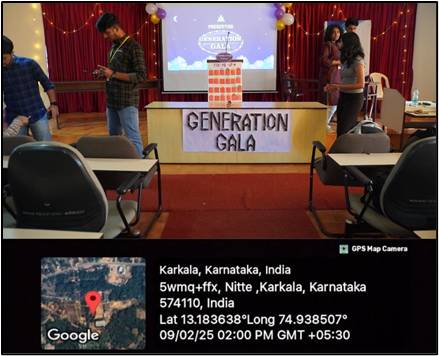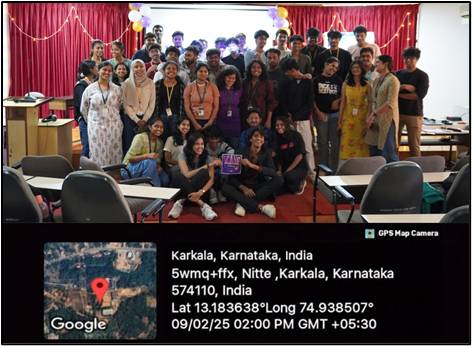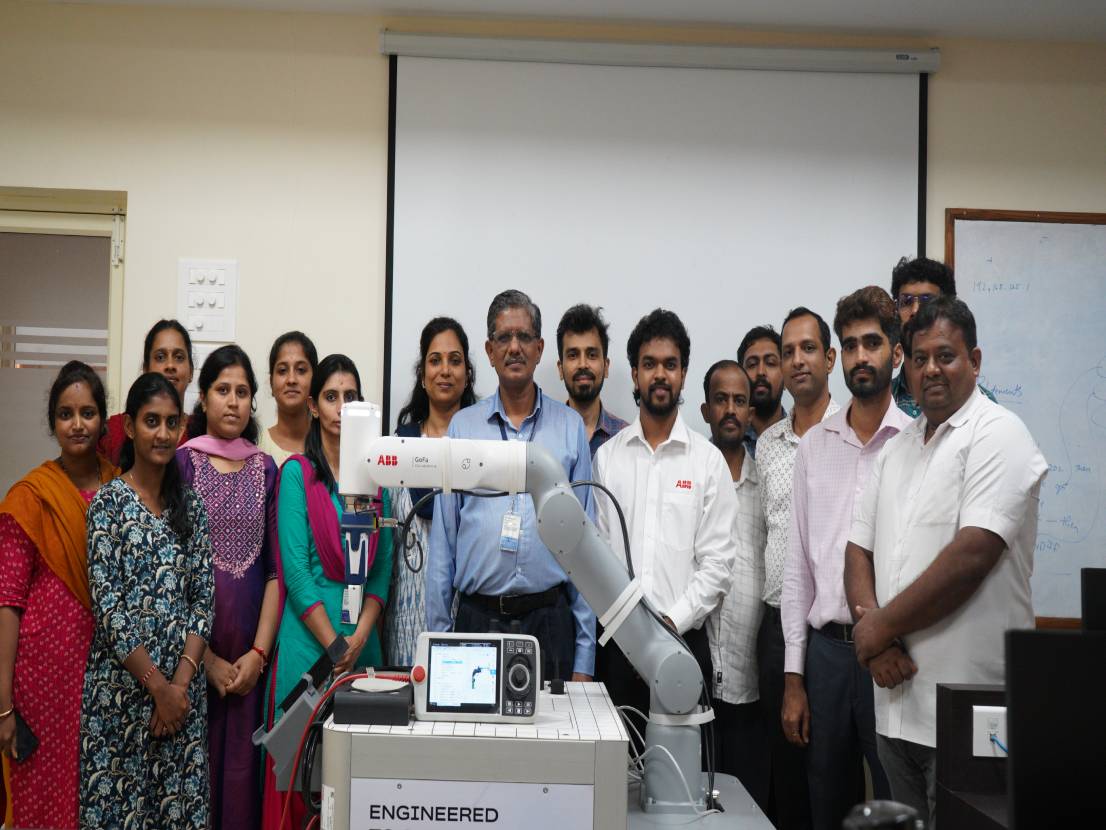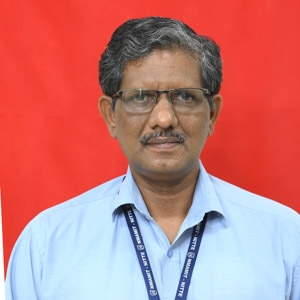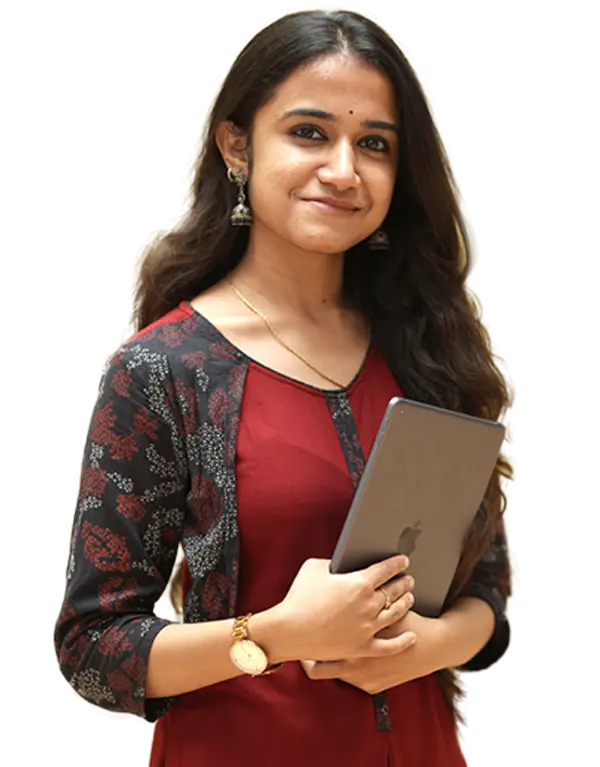
The major focus of B.Tech. program “Robotics and Artificial Intelligence” is to generate skilled personnel required for the implementation of Industry 4.0 technologies in the industry. The program presents equal percentage of Robotics and Artificial Intelligence related courses. Robotics related courses include the courses on design and manufacturing of the robot, sensing, control, programming and applications of robots. Courses related to Artificial Intelligence include basics of Programming, Machine Learning, Big Data Analytics, Deep Learning, IT and Communication Systems. Furthermore, an equal percentage of weightage is given to laboratory components in Robotics and Artificial Intelligence.
Vision
To produce Robotics and Artificial Intelligence (AI) engineers of the highest quality who are professionally competent and highly qualified to suit the needs of industries and organizations by promoting excellence in teaching, learning and research.
Mission
The Dept. of Robotics & Artificial Intelligence Engineering is committed to
- Provide high quality education to the students, to fulfill the requirements of a ‘Global Engineer’
- Constantly strive to improve the teaching-learning methods, in order to deliver good academic programs
- Respond to the fast evolving scientific and technological challenges in a highly competitive world
- Inculcate, ethics, integrity, honesty, credibility, social and environmental consciousness
Robotics and Artificial Intelligence Engineering Graduates will be able to
- Demonstrate technical competence in Robotics and Artificial Intelligence and their applications
- Design hardware solutions for robotics application and software solutions for implementation of Artificial Intelligence in Robotics
- Pursue higher studies to carry out research and development in the area of Robotics and Artificial Intelligence
- Engage in lifelong learning, communicate effectively and exhibit leadership skills and demonstrate sensitivity towards professional ethics.
- PO1: Engineering knowledge:Apply the knowledge of mathematics, science, engineering fundamentals, and an engineering specialization to the solution of complex engineering problems.
- PO2: Problem analysis: Identify, formulate, review research literature, and analyse complex engineering problems reaching substantiated conclusions using first principles of mathematics, natural sciences, and engineering sciences.
- PO3: Design/development of solutions: Design solutions for complex engineering problems and design system components or processes that meet the specified needs with appropriate consideration for the public health and safety, and the cultural, societal, and environmental considerations.
- P04: Conduct investigations of complex problems: Use research-based knowledge and research methods including design of experiments, analysis and interpretation of data, and synthesis of the information to provide valid conclusions.
- PO5: Modern tool usage: Create, select, and apply appropriate techniques, resources, and modern engineering and IT tools including prediction and modelling to complex engineering activities with an understanding of the limitations.
- PO6: The engineer and society: Apply reasoning informed by the contextual knowledge to assess societal, health, safety, legal and cultural issues and the consequent responsibilities relevant to the professional engineering practice
- PO7: Environment and sustainability: Understand the impact of the professional engineering solutions in societal and environmental contexts, and demonstrate the knowledge of, and need for sustainable development.
- PO8: Ethics: Apply ethical principles and commit to professional ethics and responsibilities and norms of the engineering practice.
- P09: Individual and team work: Function effectively as an individual, and as a member or leader in diverse teams, and in multidisciplinary settings.
- PO10:Communication: Communicate effectively on complex engineering activities with the engineering community and with society at large, such as, being able to comprehend and write effective reports and design documentation, make effective presentations, and give and receive clear instructions.
- PO11: Project management and finance: Demonstrate knowledge and understanding of the engineering and management principles and apply these to one’s own work, as a member and leader in a team, to manage projects and in multidisciplinary environments.
- PO12: Life-long learning: Recognize the need for and have the preparation and ability to engage in independent and life-long learning in the broadest context of technological change.
- PSO 1: Design the robotic structure for different applications and implementation of control circuits to achieve the desired automation through analytical, logical and problem-solving skills.
- PSO2: Develop software systems for the application of artificial intelligence in robotics.
- PSO3: Apply the knowledge of robotics and Artificial intelligence in the areas of industrial robotics, service robots, exoskeletons, surgical robots, delivery vehicles, autonomous vehicles, and crewless micro aerial vehicles.
At the end of the program students shall be able to
Laboratories
For any information regarding the admissions,mail us at: info@nitte.edu.in
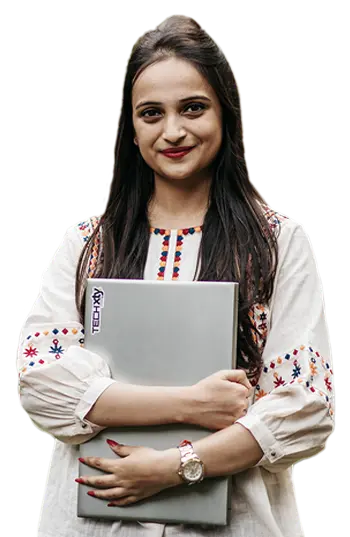
Faculty
| Name | Designation |
|---|---|
| Ms. SANDHYA | SENIOR LAB ASSISTANT |
| Ms. SHWETHA | SENIOR LAB ASSISTANT |
| Ms. MAHIMA | LAB ASSISTANT |
| Mr. KRISHNANAND RAO | LAB ASSISTANT |
| Ms. DEEKSHA PRABHU | LAB ASSISTANT |
| Ms. PRATHEEKSHA | LAB ASSISTANT |
| Mr. SURENDRA POOJARY | TECHNICIAN |
| Mr. RAJESH ACHARYA | ATTENDER |
| Ms. SHWETHA SURENDRA SHETTY | ATTENDER |
- Duration - 4 years
- Semester - 08
- Intake - 60 Students
| NAME OF THE STUDENT | COMPANY NAME | PACKAGE (LPA) |
|---|---|---|
| International Placement | ||
| Hriday Bekal | JMC Company Ltd., Japan DAISEKI Co. Ltd, Japan | 35 |
| Hriday Bekal | JMC Company Ltd., Japan DAISEKI Co. Ltd, Japan | 35 |
| Neha Naresh Alva | DAISEKI Co. Ltd, Japan | 30 |
| Franklin Joseph Fernandes | N S Technologies, Japan | 28 |
| Sreekanth K | Taiyo Machinery, Japan | 26 |
| Nehal Shetty | Aichi Sangyo Co Ltd, Japan | 25 |
| Pratham Kamath | Aichi Sangyo Co Ltd, Japan | 25 |
| Rakesh R Kattimani | TK Engineering , Japan | 24 |
| Vikram Pai | TK Engineering, Japan | 24 |
| Yashas MS | Heartwork Co.Ltd, Japan | 23 |
| H Meghana Rao | Nidec Instruments, Japan | 22.6 |
| Tarun Gopalakrishna Shenoy | Nidec Instruments, Japan | 22.6 |
| Aditi Pai K | Shibuya Corporation, Japan | 22.5 |
| Anush P Shetty | Shibuya Corporation, Japan | 22.5 |
| Deekshith | Shibuya Corporation, Japan | 22.5 |
| Divya S Salian | Shibuya Corporation, Japan | 22.5 |
| Pratham Kamath | Aichi Sangyo Co Ltd, Japan | 25 |
| George Joyston Lewis | Shibuya Corporation, Japan | 22.5 |
| Sinchana S H | Shibuya Corporation, Japan | 22.5 |
| Vaishnavi Pai | Shibuya Corporation, Japan | 22.5 |
| Subhiksha R Rai | Nidec Motors, Japan | 22 |
| National Placement | ||
| Anindya Hegde K | Autoliv India Private Ltd, Bengaluru | 6.5 |
| Preetham | Toyota Kirloskar Motor, Bengaluru | 6.26 |
| Dev Chhatwani | Juniper Networks, Bengaluru | 5.5 |
| Bhoomika | Juniper Networks, Bengaluru | 5.5 |
| Pavan B S | Glowlogics Solutions, Bengaluru | 5.2td> |
| Shravya MS | Siemens Technology & Services, Bengaluru | 5 |
| Sanketh K K | Delhivery Limited. | 4.2 |
| Adithya Singh | Infosys | 3.5 |
Student Achievement Pyramid
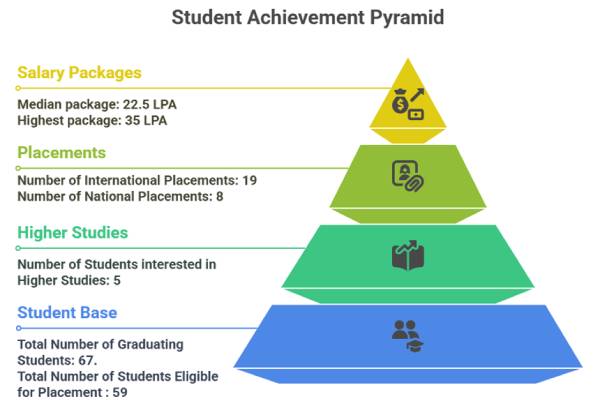
Department of Robotics and AI has participated in the Industry-Academia Pavilion, International Machine Tool Exhibition–2025 (IMTEX-2025) organised during 23rd to 29th January 2025 at BIEC Bangalore and presented the following four research posters:
- A novel design of micro XY stage for micromachining applications
- Investigations on piezo-actuator based inchworm drive
- Novel piezoelectric micro XY stage
- Three axis tool force measurement system
The research project titled “Three Axis Tool Force Measurement System” has been recognised as one of the top ten research projects in the field of Manufacturing at IMTEX 2025.
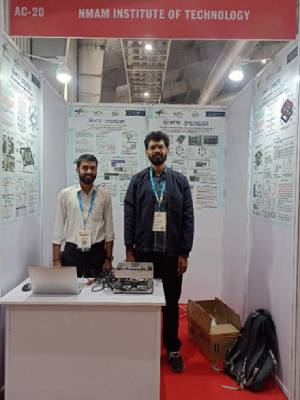
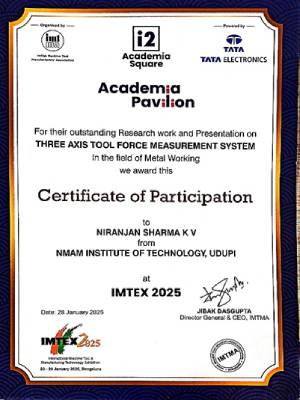
Ms. Aditi Pai K and Ms. Vaishnavi Pai K, final-year students from the Department of Robotics and Artificial Intelligence, have secured first place at the prestigious national-level innovation contest, The M. S. Yoganarasimha Prize for Innovation in Design, organized by the Fluid Power Society of India. Their award-winning project, titled “Design, Development, and Validation of a Pneumatically Actuated Inchworm Robot,” showcases cutting-edge innovation and engineering excellence. The project was successfully completed under the expert guidance of Dr. Muralidhara, Professor and Head of the Department of Robotics and AI, bringing great recognition to the department and the institution.
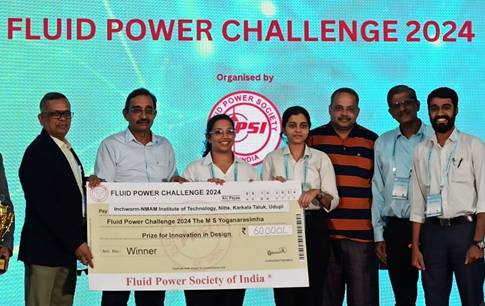
.jpg)
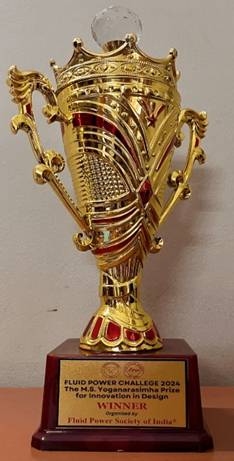
Showcasing innovation and technical excellence, a student team from the Department of Robotics and Artificial Intelligence at NMAMIT, Nitte, emerged as the Overall Champions (AIR 1) in the Micro Class category at the prestigious SAEISS Drone Development Challenge (DDC) 2024. Held at SRM Institute of Science and Technology, Chennai, from 29th to 31st August 2024, the event witnessed strong national-level participation. The winning team—Mr. Nidheesh (NNM22RI034), Mr. Ranjith R Bhandary (NNM22RI045), and Mr. Sathvik (NNM22RI049)—demonstrated exceptional design and problem-solving skills, bringing laurels to the institution.
The competition challenged teams to design, fabricate, and fly a lightweight, fixed-wing UAV that could be quickly assembled and deployed from a compact storage container, with a focus on maximizing payload fraction. Competing against top engineering institutions, the NMAMIT team impressed the judges through their outstanding design report, technical presentation, rapid assembly demonstration, and precise flight performance. Their innovative approach, attention to structural efficiency, and flawless execution in meeting the competition’s rigorous technical standards earned them the coveted first-place finish, showcasing the department’s growing excellence in cutting-edge drone technology and UAV innovation.
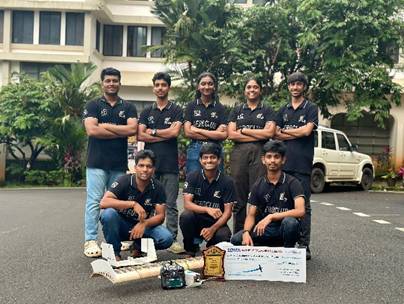
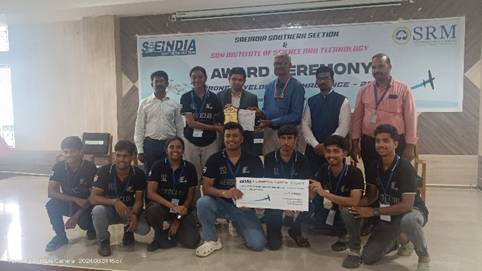
At the SAEISS Autonomous Drone Development Challenge (ADDC) 2025, held at KCG College of Technology, Chennai, on 4 to 5 April 2025, Mr. Ranjith R Bhandary (NNM22RI045) and Mr. Sathvik (NNM22RI049) from the Department of Robotics and Artificial Intelligence at NMAMIT, Nitte, secured an impressive Overall Second Prize (AIR 2) and Unique Technology Development Third Prize (AIR 3).
In this high-stakes competition, teams were tasked with developing an autonomous drone capable of simulating last-mile delivery in complex urban settings navigating predefined routes, avoiding obstacles, and performing delivery tasks without manual intervention. Demonstrating advanced skills in autonomous path planning, obstacle detection, and precise navigation, the NMAMIT team stood out for their innovative design and reliable delivery mechanisms. Their dual award win highlights not only their technical excellence but also their creativity and problem-solving capabilities in addressing real-world challenges of aerial delivery systems.
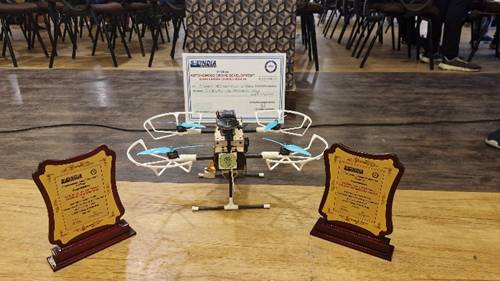
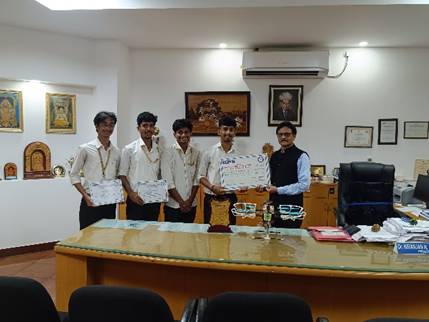
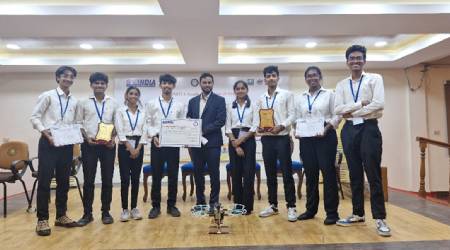
Mr. Shreyas (NNM23RI057), a fourth semester student, and his team achieved an impressive third place at the prestigious Boeing National Aeromodelling Competition held at IIT Bombay on 29 December 2024. The event challenged participants to design and fabricate a radio-controlled (RC) aircraft capable of lifting the maximum payload while adhering to a strict thrust-to-weight ratio of less than one. Through multiple design iterations, simulations, and test flights, Shreyas’s team developed an optimized fixed-wing aircraft that demonstrated excellent lift, balance, and structural efficiency. The judges praised their innovative approach, flight stability, and effective payload management, recognizing the team’s outstanding teamwork, technical skill, and problem-solving abilities in the demanding field of aeronautical engineering.
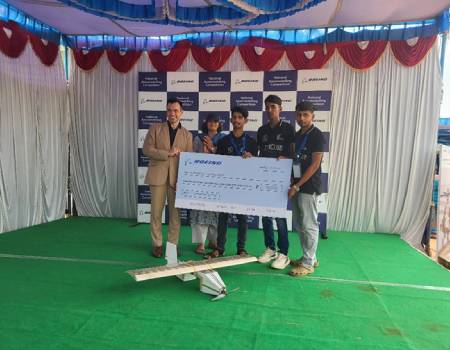
Mr. Shreyas (NNM23RI057), of IV Semester, participated in the Boeing National Aeromodelling Competition held at IIT Madras on 25 and 26 January 2025. The competition challenged teams to design and fabricate a radio-controlled aircraft capable of carrying the maximum number of golf balls as payload and accurately dropping them within a 10-meter radius target circle. Additionally, the aircraft had to meet a thrust-to-weight ratio constraint of 1.2, making it a true test of design efficiency and piloting precision.
The team shared that they had engineered a lightweight yet robust aircraft, specifically optimized for stability and precise payload release. One of the team members, who served as the pilot, successfully executed the flight and achieved a highly accurate payload drop within the designated target zone. Their outstanding performance earned them the First Place award and a coveted spot in the national finals to be held in Delhi later this year. The team expressed that this achievement was a testament to their collaborative spirit, innovative thinking, and practical aeronautical expertise.
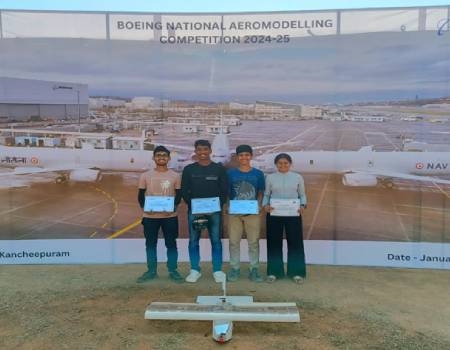
Mr. Shreyas (NNM23RI057), IV Semester, participated in the SAE Aero Design Challenge 2025, held on 30 March 2025 at Karpaga Vinayaga College, Chennai. Competing in the Micro Class category, teams were tasked with designing, fabricating, and analyzing a compact RC aircraft capable of efficient performance within strict weight and dimension constraints. The challenge emphasized innovative design, structural efficiency, and detailed aerodynamic analysis.
The team reported that they had extensively focused on optimizing the aircraft’s aerodynamic profile through computational simulations and analysis using ANSYS software. Their efforts culminated in securing First Place in the Best Aerodynamic Analysis category, underscoring the precision and rigor of their design validation process. They reflected that the event offered an excellent platform to translate theoretical knowledge into practical application and reaffirmed the critical role of data-driven engineering in modern aircraft development.

Mr. Ausaaf, Mr. Deekshith, Mr. Madhwesh, and Mr. Tarun showcased exceptional talent at Robothon 2k24, held at Jyothy Institute of Technology, Bengaluru. The team secured second place in the competition, standing out among numerous participants with their innovative and precise robotics solutions. In recognition of their achievement, they were also awarded a cash prize of ₹20,000, celebrating their hard work, creativity, and teamwork in this prestigious event.

Showcasing innovation and teamwork, Ms. G. Kshma Pai, Mr. Atreya G. Nayak, Mr. Likhith T. Acharya, and Mr. Karan Karkera—third-year students of the Robotics and AI Programme at NMAMIT, Nitte, and active members of White Shadow Robotics and the Robotics Club Nitte—secured the Second Runner-Up position at Robothon 2k24, held at Jyothy Institute of Technology, Bengaluru. Their impressive performance earned them a cash prize of ₹10,000, recognizing their and commitment to excellence in robotics.
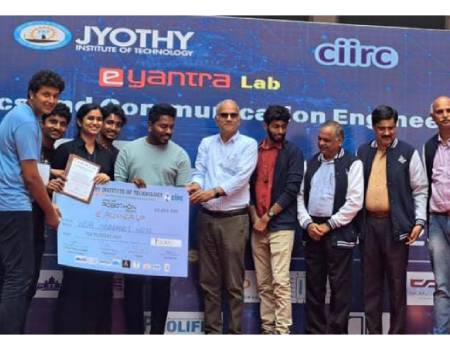
Demonstrating technical ingenuity and collaborative spirit, the team—working in association with the Department of Robotics and Artificial Intelligence—designed and developed an innovative rover solution for the prestigious ISRO Rover Challenge. Competing among 1,500 teams across the country, they achieved a commendable rank within the top 150. This accomplishment highlights their strong foundation in robotics, effective teamwork, and problem-solving capabilities in real-world, mission-driven scenarios.
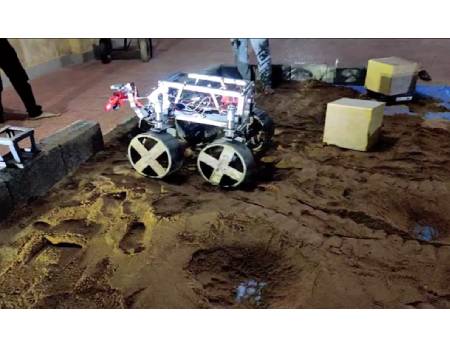
Mr. Sinchana S H (4NM21RI047), an VIII semester student, has been honored with the Award of Distinguished Achievement as part of the prestigious Sanjeeth Shetty Leaders Fellowship (TSSLF) Cohort 2025, a flagship initiative of the Sanjeeth Shetty Foundation. This recognition celebrates Sinchana’s exceptional leadership, active contributions, and positive impact within both the academic sphere and the broader community. The fellowship emphasises the values of empathy, innovation, and collaborative leadership, aligning with the Foundation’s mission to nurture principled, forward-thinking leaders equipped to tackle global challenges with clarity, compassion, and accountability.
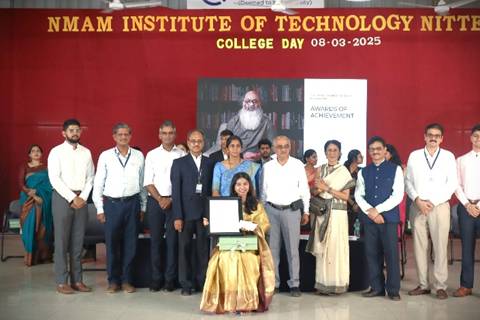

A three-day Faculty Development Program (FDP) on "Embedded Applications Using Edge AI" was organised from 25 - 27 November 2024 at NMAMIT, Nitte. Resource persons included Mr. Chiranjivi and Mr. Naveen Kumar from Digitod Technologies, and Mr. Ranjith Bhat from NMAMIT, Nitte.
The program offered participants comprehensive insights into the integration of AI into embedded systems. Sessions covered programming STM32 microcontrollers, handling GPIO interrupts, and implementing machine learning models using TensorFlow Lite. Participants were guided through practical applications, including sensor data acquisition, real-time data logging, and Edge AI decision-making workflows.
The workshop provided a deep dive into using STM32 Cube AI for model deployment and anomaly detection. By the end of the program, participants were equipped with robust skills to address modern challenges in embedded AI.
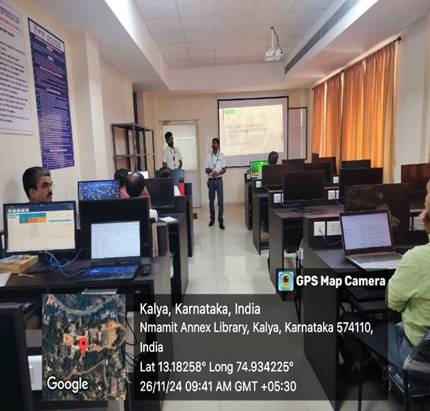
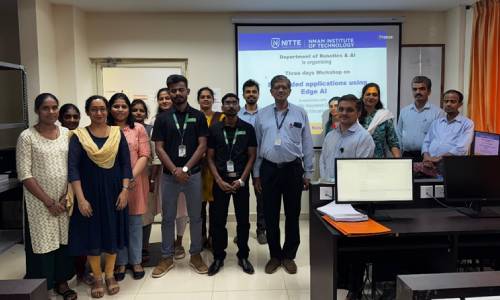
The Department of Robotics and Artificial Intelligence Engineering at NMAMIT, Nitte, organised a five-day workshop on “ROS-2 for Robotic Applications” from 9 to 13 December 2024. The inaugural ceremony was held in the Phalguni Seminar Hall and was officially inaugurated by Dr. Niranjan N. Chiplunkar, Principal and Program Chair of the workshop, NMAM Institute of Technology, Nitte.
The event was graced by the presence of Dr. Asha C. S. and Dr. Jean Marina D’Souza, both from the Department of Mechatronics at Manipal Institute of Technology, along with Dr. Muralidhara, Head of the Robotics and AI Department and the workshop convener.
The opening ceremony highlighted the workshop’s goal of empowering educators, researchers, and professionals with the skills needed to teach and work with ROS-2 (Robot Operating System 2) in their respective areas. The event brought together Heads of Departments, faculty members, invited guests, and participants, marking the start of an engaging and insightful learning experience.
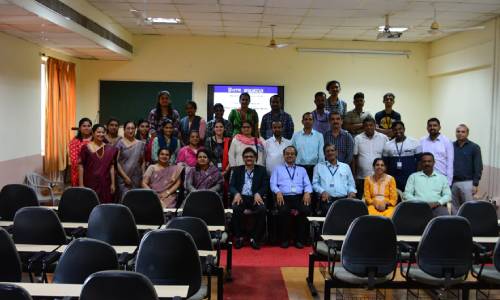
A six-day Faculty Development Program (FDP) on “Image Processing Applications with Dobot Magician” was organised by Ekzen Robotics, Bangalore, on 17-19 February and 1-3 April 2025. The program provided faculty members and lab instructors with hands-on training in robotics and computer vision using the Dobot Magician.
Key sessions included an introduction to the Dobot Magician, Conveyor Kit, and Vision Kit, along with their integration for real-time applications. Participants engaged in practical exercises such as pick-and-place tasks based on the RGB color space, object identification using shape and color, and template matching techniques with the Dobot Vision system.
The FDP enabled participants to gain valuable experience in automating tasks through vision-based robotics.
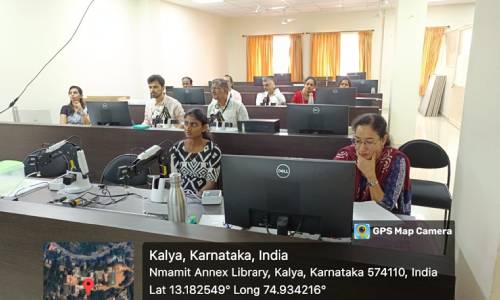
A Three-Day Faculty Development Program on “AR and VR in Engineering Education” Inaugurated at NMAMIT Nitte. The Department of Robotics and Artificial Intelligence at NMAMIT, Nitte (Deemed to be University), inaugurated a three-day Faculty Development Program (FDP) on “AR and VR in Engineering Education” 17 December 2024.
The event featured Ms. Jimcymol James, Assistant Professor from the Department of Computer Science & Engineering, MIT Manipal, as the Guest of Honour. In her address, Ms. James emphasized the transformative potential of Augmented Reality (AR) and Virtual Reality (VR) in revolutionizing engineering education.
Dr. Muralidhara, Head of the Department of Robotics and Artificial Intelligence, delivered the welcome address. The workshop was inaugurated by Vice Principal and Dean, Dr. I.R. Mithanthaya, who also delivered the presidential address, highlighting the significance of emerging technologies in the academic landscape.
The FDP was coordinated by Dr. Rashmi P. Shetty, Associate Professor, Department of Robotics and Artificial Intelligence. The program aims to equip faculty members with the knowledge and tools to integrate AR and VR into engineering education, fostering innovative teaching methodologies. The workshop is expected to provide hands-on experience and engage participants in discussions about the pedagogical applications of AR and VR technologies.
The Faculty Development Program (FDP) on Augmented Reality (AR) and Virtual Reality (VR) provided participants with in-depth knowledge of AR/VR technologies and their applications in robotics and manufacturing. The program was divided into three informative and interactive sessions.
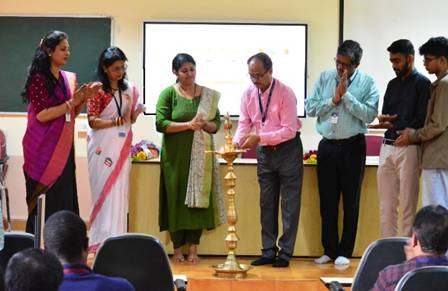
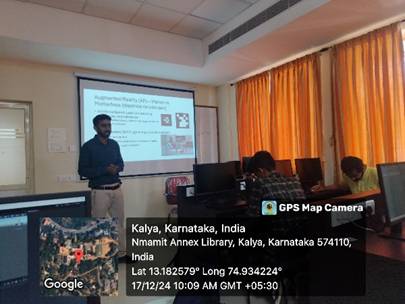
The Institution’s Innovation Council (IIC), in collaboration with the Robotics and Artificial Intelligence Society for Engineers (RISE), organized a technical talk on “Space Robotics” on 25 March 2025 at NMAMIT, featuring Dr. A.G. Ananth, Former Director of ISRO’s Respond Program and Visiting Professor at NMAMIT. Dr. Ananth provided valuable insights into ISRO’s advancements in space technology, the role of robotics in exploration, rocket and satellite systems, deep space missions like Chandrayaan, and innovations such as space-bound robo dogs.
The session was highly informative and interactive, broadening students’ understanding of space robotics, satellite technologies, and the challenges of designing systems for space environments. The event concluded with a vote of thanks and the presentation of a memento to Dr. Ananth, leaving participants inspired to explore careers in the rapidly evolving field of space technology and robotics.
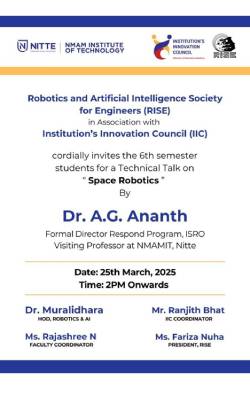
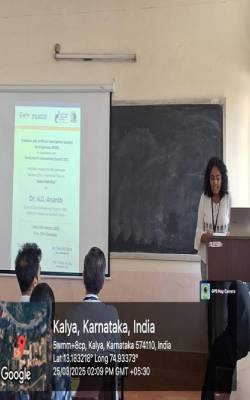

The Nitte Center of Excellence for Applied Artificial Intelligence, in collaboration with the Department of Robotics and Artificial Intelligence at NMAM Institute of Technology, Nitte, successfully organized a five-day training program on "Augmented Reality and Virtual Reality" from 2 to 7 January 2025. The program was held at the AIML Lab in the Department of Robotics and Artificial Intelligence and was conducted in association with ARK Infosolutions Pvt. Ltd., Bengaluru. The training aimed to equip participants with hands-on knowledge and practical skills in developing immersive AR and VR applications using Unity.
The event commenced with a warm welcome address delivered by Dr. Rashmi P. Shetty, Associate Professor, Department of Robotics and Artificial Intelligence. The workshop was formally inaugurated by the esteemed Principal, Dr. Niranjan N. Chiplunkar, in the presence of Dr. Muralidhara, Professor and Head of the Department of Robotics and Artificial Intelligence, and Mr. Ramesh Kumar, Senior Technical Consultant, ARK Infosolutions Pvt. Ltd., Bengaluru.
In his presidential address, Principal Dr. Niranjan N. Chiplunkar emphasized the importance of emerging technologies such as Augmented Reality (AR) and Virtual Reality (VR) in the academic and professional landscape. He highlighted the transformative potential of AR and VR in enhancing learning, research, and innovation.
The vote of thanks was delivered by Dr. Roopa Hegde, Associate Professor, Department of Electronics and Communication, expressing gratitude to all dignitaries, participants, and collaborators for their valuable contributions to the program.


On 29 August 2024, the Department of Robotics and Artificial Intelligence organized a technical talk titled “Autonomous and E-Mobility Systems,” delivered by Mr. E. Murlikrishnan, Head of Autonomous and E-Mobility at Edutech India Pvt. Ltd. The session, attended by faculty and 3rd and 4th year students, focused on the critical role of programming, particularly in C, Python, and C++, for both software and hardware development in the autonomous and e-mobility sectors
Mr. Murlikrishnan highlighted the importance of project-based learning, understanding electric vehicle architecture (including battery management and control systems), and exploring cutting-edge technologies like hardware-in-the-loop (HIL), rapid control prototyping (RCP), and CAN bus communication. He also provided insights into future trends such as “Drive by Wire” and “Steer by Wire” systems, encouraging students to equip themselves with relevant skills to seize emerging opportunities in the evolving e-mobility landscape.
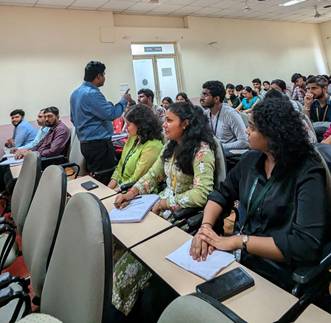
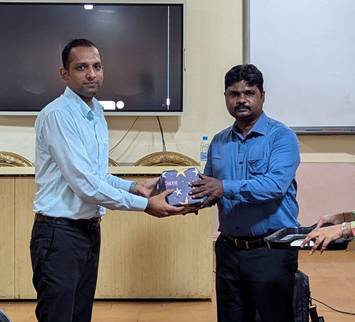
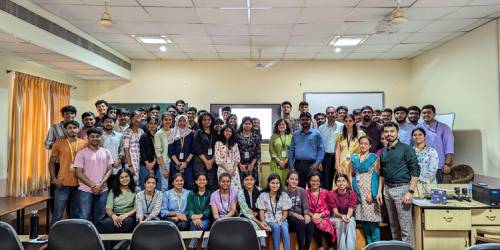
On 10 October 2024, the Robotics Department joyfully celebrated Ayudha Puja with devotion and enthusiasm. The event featured beautifully decorated laboratories with mango leaf toranas, vibrant powder and flower rangolis, and a reverently placed deity in the Internship Lab. A soulful bhajan session, led by twelve students and a faculty member, filled the space with spiritual energy, followed by a heartfelt puja ceremony conducted by a priest, invoking blessings for knowledge, creativity, and success.
Active participation from II, III and IV year students ensured smooth organisation, supported by the Head of the Department, Dr. Murlidhara, and the faculty. The event concluded with prasada distribution and a cheerful group photo, strengthening bonds within the department. The celebration beautifully blended cultural tradition with teamwork, reminding everyone of the importance of balancing spirituality with academic and technological pursuits.

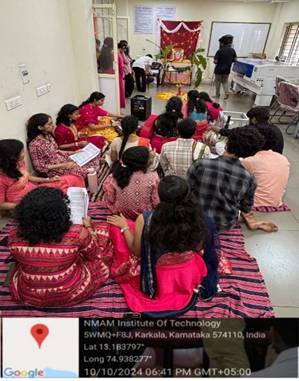
The “Lucky Lanterns” event, held on 9 November 2024 at Shambhavi Hall, was a lively and engaging celebration of creativity, teamwork, and friendly competition. Participants were grouped into eight themed teams through a chit-based draw, with themes ranging from Butterfly to Under the Sea. The event featured a series of interactive games — including general knowledge rounds, UNO, Bollywood quizzes, and tumbling cup challenges — that allowed teams to win crafting supplies for their lantern designs.
Following the games, teams had one hour to create theme-based lanterns and present imaginative stories aligned with their designs. The event concluded with audience voting and the announcement of the winning team, Tangled (Pratheeksha, Vikram, Ashirvad, Darshan), who received a cash prize of ₹800. With smooth coordination by the organising team, volunteers, and technical crew, “Lucky Lanterns” successfully blended fun, creativity, and collaboration, leaving participants with memorable experiences and a strengthened sense of camaraderie.
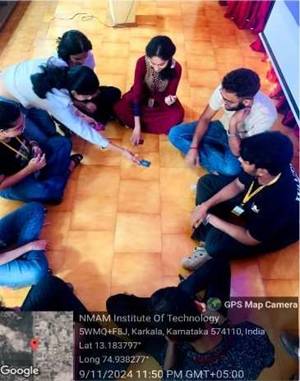
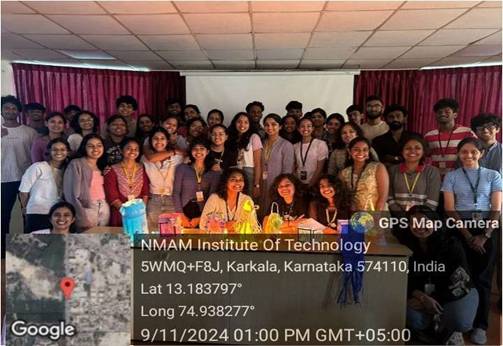
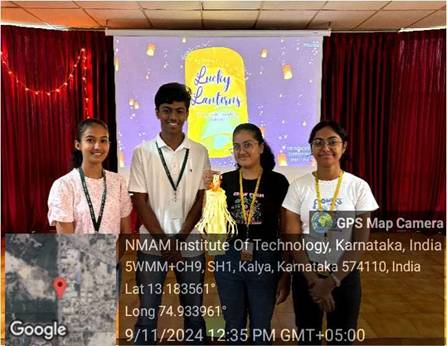
The “Lucky Lanterns” event, held on 9 November 2024 at Shambhavi Hall, was a lively and engaging celebration of creativity, teamwork, and friendly competition. Participants were grouped into eight themed teams through a chit-based draw, with themes ranging from Butterfly to Under the Sea. The event featured a series of interactive games — including general knowledge rounds, UNO, Bollywood quizzes, and tumbling cup challenges — that allowed teams to win crafting supplies for their lantern designs.The “Lucky Lanterns” event, held on 9 November 2024 at Shambhavi Hall, was a lively and engaging celebration of creativity, teamwork, and friendly competition. Participants were grouped into eight themed teams through a chit-based draw, with themes ranging from Butterfly to Under the Sea. The event featured a series of interactive games — including general knowledge rounds, UNO, Bollywood quizzes, and tumbling cup challenges — that allowed teams to win crafting supplies for their lantern designs.
The session featured interactive discussions, a hands-on robot demo, and a lively Q&A segment, leaving the audience motivated and informed about real-world trends in robotics and R&D. The event concluded with a vote of thanks and memento presentation, marking a memorable learning experience for all attendees.
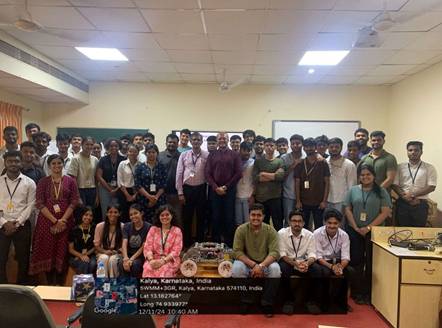
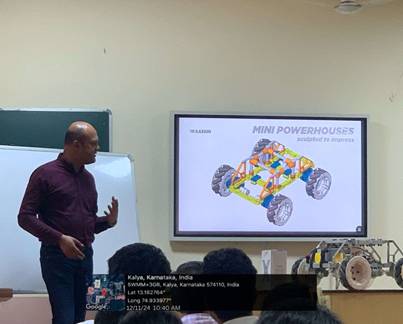
On 14 November 2024, Shambhavi Hall hosted an insightful technical talk by Dr. Ravi Hadimani, Associate Professor and Director of the Biomagnetics Laboratory at Virginia Commonwealth University, on the topic “Advancing Neurological and Psychiatric Care: Insights into Magnetic Brain Stimulation and Emerging Technologies.” The session, attended by faculty, students, and distinguished guests, explored the science, applications, and future potential of Magnetic Brain Stimulation (MBS), particularly Transcranial Magnetic Stimulation (TMS), in treating conditions like depression, Parkinson’s disease, stroke recovery, and chronic pain. Dr. Ravi highlighted the mechanisms behind MBS, its safety profile, and its effectiveness as a non-invasive alternative for patients who do not respond well to conventional treatments.
A key focus of the talk was the integration of robotics and artificial intelligence with MBS to enhance real-time monitoring, optimize stimulation protocols, and improve rehabilitation outcomes. Dr. Ravi emphasized that these emerging technologies could revolutionize patient care by making treatments more precise, efficient, and accessible. The session concluded with engaging discussions and left the audience with valuable insights into the future of neurotechnology and precision medicine.
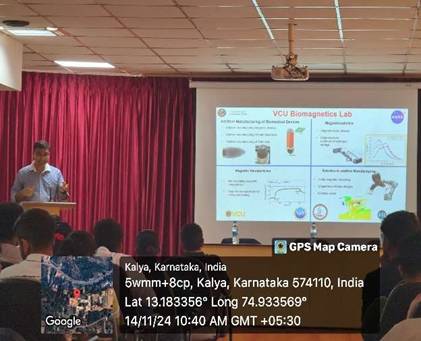

The Quadcopter Workshop 2024, held on 16 to 17 November at NMAM Institute of Technology, was organized by Aeroclub Nitte in association with RISE (Robotics and Artificial Intelligence Society for Engineers) and the Department of Robotics and AI. The workshop provided 57 engineering students, divided into 10 teams, with a rich hands-on experience in designing, assembling, and flying quadcopters.
On Day 1, participants engaged in detailed technical sessions covering the basics of quadcopters, electronics, and mission planning, followed by team-based fabrication activities assisted by 24 Aeroclub volunteers. Day 2 focused on final assembly and flying sessions, where teams tested their quadcopters despite minor weather delays. The workshop concluded successfully, with all teams completing their builds, gaining practical simulation experience, and providing positive feedback. The event showcased excellent planning, teamwork, and volunteer support, making it a memorable and inspiring experience for future engineers interested in robotics and aerial systems.
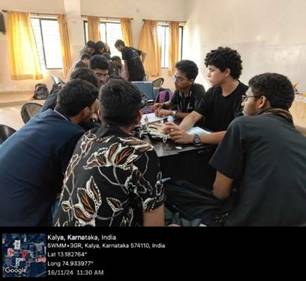

On 16 November 2024, the Department of Robotics hosted a memorable farewell event titled “Once Upon a Birthday” at Sambhram AC Auditorium and CV Raman Classroom to celebrate and honor the outgoing 4th-year students. The day blended nostalgia, fun, and heartfelt appreciation, with activities ranging from interactive games like Minute to Win, Voice Guessing, and Gen Z vs Millennial, to dance performances by students across years, a touching memory video, and a cake-cutting ceremony. Faculty members and students came together to reflect on the achievements of the graduating batch, sharing laughter, memories, and best wishes for the future.
The afternoon continued with playful games, a lively lunch, and concluded with a high-energy DJ session that had everyone dancing and celebrating the bonds forged over the years. The farewell was a resounding success, leaving both students and faculty with cherished memories. The creative birthday-themed farewell added a special emotional touch, marking not just an end but also a joyful send-off to the bright futures ahead for the graduating class.
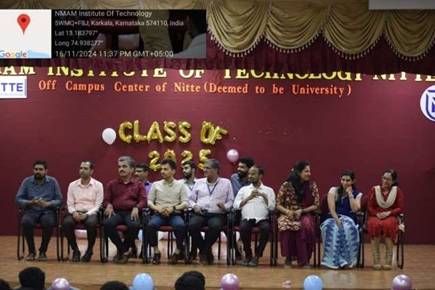
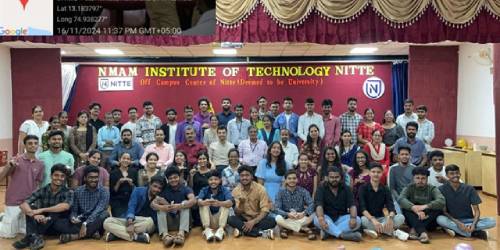
The Vision Forge Workshop and Competition held on 25 January 2025 provided participants with a comprehensive introduction to both basic and advanced image processing techniques. The event combined interactive learning sessions on topics such as dilation, edge detection, text recognition, and face detection with a competitive format involving hands-on challenges and quizzes. Participants gained practical experience using Jupyter Notebook and applied their knowledge to solve real-world image processing problems, fostering teamwork, problem-solving, and critical thinking.
The workshop concluded with a point-based competition where participants demonstrated their skills through tasks and quizzes, culminating in the announcement of winners. Overall, the event successfully equipped students with valuable theoretical insights and practical skills in computer vision, encouraging creativity and collaboration in the field.
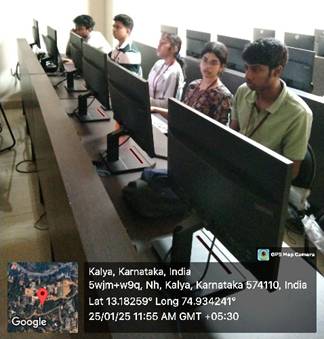

The talk on “Revolutionizing Mobility: Rosh AI’s Journey Toward Autonomous Driving in India” highlighted the ambitious efforts of Rosh AI, a pioneering deep-tech startup focused on developing autonomous driving technologies suited for India’s unique challenges. Mrs. Radhika from Rosh AI detailed the various obstacles to implementing autonomous vehicles in India, such as poor road conditions, unclear lane markings, unpredictable traffic behaviour, infrastructure limitations, and adverse weather. Additionally, public trust and regulatory frameworks remain significant hurdles. Despite these challenges, government initiatives like the Smart City Mission and growing electric vehicle adoption create opportunities for gradual progress.
Rosh AI’s innovative solutions include retrofit autonomy frameworks, AI-powered driving platforms, high-definition mapping, and fleet management systems tailored to Indian conditions. Their technologies are currently applied in automotive inspection, logistics, construction, agriculture, and warehousing. With over 100,000 km of driverless testing and numerous patents, Rosh AI is steadily advancing autonomous driving by focusing on controlled B2B environments to build trust and reliability before public rollout. The company envisions a future where autonomous vehicles enhance safety, efficiency, and sustainability on Indian roads through collaboration with government bodies, industry, and society.
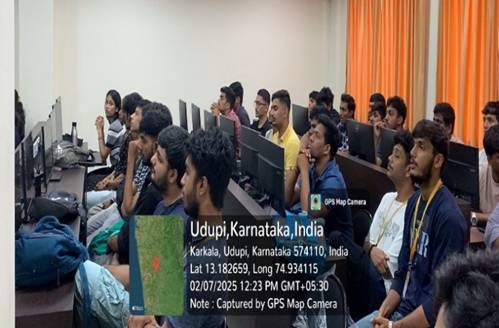

Generation Gala 2.0, held on 8 February 2025 at Shambhavi Hall, was a vibrant and competitive event inspired by the popular game show "Family Feud." Ten enthusiastic teams competed through three engaging rounds designed to test their logical reasoning, prioritization, and teamwork skills. The event was expertly hosted by Afraz Ahmed and Ann Sandra, supported by a dedicated team managing technical, audio, and logistical aspects. Icebreaker activities such as Dumb Charades and a Push-Up Competition added fun and energy between the main rounds.
The competition saw intense matchups, with Team Jinx ultimately emerging as the champions after a closely contested final against Team Tiramisu. Generation Gala 2.0 was not just a test of quick thinking and collaboration but also a celebration of student spirit and camaraderie. The event left a lasting impression on participants and spectators alike, setting a high benchmark for future editions and promising even greater excitement in Generation Gala 3.0.
